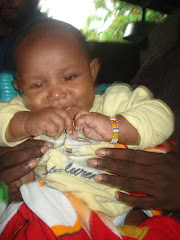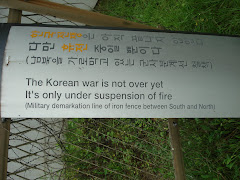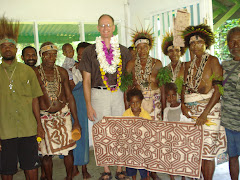Wednesday, December 17, 2008
Building Dialogue Among Civilizations
Creating Global Commitment to the Earth
One of the critical issues facing persons engaged in dialogue with other civilizations is creating awareness that no matter how different we might be we all inhabit the same globe. For instance, there is no such thing as a limited nuclear war. What we are talking about vis-à-vis nuclear arms is assured mutual destruction. Also, what one nation does to harm the environment has global ramifications: poisoning rivers and oceans, destroying coral reefs, polluting the atmosphere; all these things contribute to global warming and denigrate our common human habitat. If we disagree on religious beliefs, political systems, even cultural attitudes towards women, homosexuals, and other minorities, a compelling case for dialogue can be made for the preservation of this fragile earth, our island home in the universe.
Building on shared self-interest in survival, my next thought would be to frame discussions about the environment as peace-keeping accords; commitment to peace and commitment to the environment being two sides of the same survival coin. Respect for the environment breeds reverence for life in all its forms, which is necessary if we are create a new global consciousness through dialogue. Respect and reverence preclude violence.
Developing a Personal Practice for Peace
The hasty thought or bitter retort conceived in anger can do incalculable damage to relationships. They are a form of violence. Words have the power to unleash bullets and poisons on the earth. Thus it is important that every person look at those places in him or herself where anger lurks. Most of us are fairly scrupulous about dealing with anger in our most intimate relationships, though we could most of us still do better. Many enlightened people however allow prejudice to flourish when thinking about people who are different from us, or from whom we have received a national insult or injury. One of the best ways to transform personal anger and prejudice against other peoples and cultures is to visit them: meet the people, eat their food, admire their cultural monuments, read their literature. Words also have the power to heal, unleash creativity, and bring strangers together. Admiration for beauty must give way to respect for the creators of it. I would strongly recommend an in-depth, appreciative (non-competitive) education about the different cultures of the world as a basis for permanent peace, and a basis for civilian diplomacy and dialogue. The great peacemakers of the world have all been great lovers of culture.
Creating an historical perspective
Without a deeper understanding of history, we can only engage in shallow conversation, not truly transformative dialogue.
We need to create broader understandings and an historical perspective when dealing with the peoples most different from us. In preparation for my trip to Iran I read Steven Kinzer’s book about the U.S. engineered coup toppling Mossadeq’s regime and replacing him with the Shah. No wonder many Iranians don’t trust the US! But I never knew of these events before. Another historical grievance I never considered was the downing of the airbus by the US Navy in which nearly 300 civilians were killed; and the US only regretted it, while decorating the Navy commander as a hero. Not knowing these key events in the Twentieth Century, who wouldn’t be mystified by the Iranians’ distrust of the US?
We must push for greater honesty and a diversity of voices when we teach about foreign affairs and our relations with other cultures. Too often the assumptions underlying the work of authors of text books go unexamined. Lack of knowledge breeds false insights and fosters violence.
One of the critical issues facing persons engaged in dialogue with other civilizations is creating awareness that no matter how different we might be we all inhabit the same globe. For instance, there is no such thing as a limited nuclear war. What we are talking about vis-à-vis nuclear arms is assured mutual destruction. Also, what one nation does to harm the environment has global ramifications: poisoning rivers and oceans, destroying coral reefs, polluting the atmosphere; all these things contribute to global warming and denigrate our common human habitat. If we disagree on religious beliefs, political systems, even cultural attitudes towards women, homosexuals, and other minorities, a compelling case for dialogue can be made for the preservation of this fragile earth, our island home in the universe.
Building on shared self-interest in survival, my next thought would be to frame discussions about the environment as peace-keeping accords; commitment to peace and commitment to the environment being two sides of the same survival coin. Respect for the environment breeds reverence for life in all its forms, which is necessary if we are create a new global consciousness through dialogue. Respect and reverence preclude violence.
Developing a Personal Practice for Peace
The hasty thought or bitter retort conceived in anger can do incalculable damage to relationships. They are a form of violence. Words have the power to unleash bullets and poisons on the earth. Thus it is important that every person look at those places in him or herself where anger lurks. Most of us are fairly scrupulous about dealing with anger in our most intimate relationships, though we could most of us still do better. Many enlightened people however allow prejudice to flourish when thinking about people who are different from us, or from whom we have received a national insult or injury. One of the best ways to transform personal anger and prejudice against other peoples and cultures is to visit them: meet the people, eat their food, admire their cultural monuments, read their literature. Words also have the power to heal, unleash creativity, and bring strangers together. Admiration for beauty must give way to respect for the creators of it. I would strongly recommend an in-depth, appreciative (non-competitive) education about the different cultures of the world as a basis for permanent peace, and a basis for civilian diplomacy and dialogue. The great peacemakers of the world have all been great lovers of culture.
Creating an historical perspective
Without a deeper understanding of history, we can only engage in shallow conversation, not truly transformative dialogue.
We need to create broader understandings and an historical perspective when dealing with the peoples most different from us. In preparation for my trip to Iran I read Steven Kinzer’s book about the U.S. engineered coup toppling Mossadeq’s regime and replacing him with the Shah. No wonder many Iranians don’t trust the US! But I never knew of these events before. Another historical grievance I never considered was the downing of the airbus by the US Navy in which nearly 300 civilians were killed; and the US only regretted it, while decorating the Navy commander as a hero. Not knowing these key events in the Twentieth Century, who wouldn’t be mystified by the Iranians’ distrust of the US?
We must push for greater honesty and a diversity of voices when we teach about foreign affairs and our relations with other cultures. Too often the assumptions underlying the work of authors of text books go unexamined. Lack of knowledge breeds false insights and fosters violence.
Subscribe to:
Post Comments (Atom)






No comments:
Post a Comment